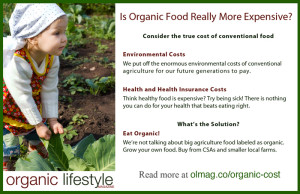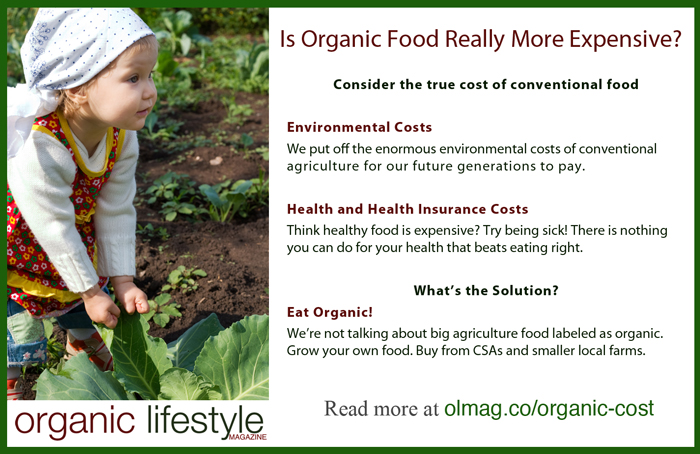Why Organic Food Is More Expensive
Grocery Shopping Makes Me Angry
I used to love to shop—especially at the farmers market. All those rows of beautiful, colorful, fruit and veggies. You could find anything—everything! It was paradise. But the last few times I went shopping, I didn’t enjoy the experience at all.
It wasn’t the long lines and the swarms of people; I avoid shopping on the weekends and during the “rush hour.” What makes me angry is the limited supply of organic produce and the outrageous prices.
One of the farmer’s m arkets I frequent shelves all of its organic produce along one short wall. I’d estimate 23 linear feet of refrigeration and shelving. Turn around and you will see at least ten times as much conventional produce, at much lower prices. This particular market caters to the local Asian and Hispanic population, selling exotic greens and rare fruits, along with the staples we all use. I want to try cactus and funny looking eggplant, dragon fruit and star fruit, but none of these choices are organic.
arkets I frequent shelves all of its organic produce along one short wall. I’d estimate 23 linear feet of refrigeration and shelving. Turn around and you will see at least ten times as much conventional produce, at much lower prices. This particular market caters to the local Asian and Hispanic population, selling exotic greens and rare fruits, along with the staples we all use. I want to try cactus and funny looking eggplant, dragon fruit and star fruit, but none of these choices are organic.
In the farmer’s market where I do the bulk of my shopping, there was an entire row of peppers and an entire row of cucumbers, and not one of them was organic. And nearly every organic item was priced at twice the price per pound. If the conventional item was 99 cent a pound, the organic equivalent’s sticker read 1.99 per pound. There are exceptions of course. Organic watermelon was four times the price of conventional.
Why do we pay more to avoid being poisoned by our food?
Why Is Organic Food More Expensive?
Certified organic food is more expensive for several reasons. First and foremost good old supply and demand. Normally when we hear those magic words we think that the price was merely jacked up as high as the market will bear. But the truth is, when you only look at the short term costs, organic farming does cost more—at least in upfront labor costs, post harvest handling, marketing, and distribution.
According to the Food and Agriculture Organization of the United Nations, this is true around the world. They state:
- “Post-harvest handling of relatively small quantities of organic foods results in higher costs because of the mandatory segregation of organic and conventional produce, especially for processing and transportation;
- Marketing and the distribution chain for organic products is relatively inefficient and costs are higher because of relatively small volumes.”
Organic certification also adds considerable cost to the small farmer, both in fees and labor.
When we buy organic meats and dairy, we know the animals’ care and treatment was considerably better than that of animals raised in factory farms. The conventional big business practice is to leave these pitiful animals standing in filth, crowded in bins. They are fed low- cost GMO laden feed and shot full of antibiotics and hormones to keep them alive until they can be butchered. Yes, of course, this inhumane treatment is less expensive than raising free range, organic fed, healthy animals. It is illegal to abuse a pet, yet when it comes to raising cows, pigs, sheep, chickens, and turkeys, we allow horrific, unspeakable animal cruelty to be the accepted norm.
Farming is much the same. In the short term it is cheaper to grow huge fields of one crop, to dump chemicals into the earth and spray with pesticides, to strip the land, than it is to rotate crops, replenish the soil naturally, and grow healthy pest resistant and disease resistant plants. Instead, over time more and more chemicals are used to yield the same crops. But our fertile earth is dying, stripped of minerals and the healthy bacteria that ensures nutrient rich food.
The Cost of Conventional Agriculture
Although the current costs of conventional food are low, the true cost is so much higher. It’s not just the little known fact that conventional farming is highly subsidized by the government, while organic farming is not. The true cost of today’s cheap conventional food does not reflect destruction of our farmlands, the health of the farm workers exposed to pesticides, or the effect on the health of every man, woman, and child eating foods with substandard nutrients contaminated with pesticides and herbicides, not to mention the genetically modified atrocities that disrupt fertility and damage our organs.
How Do We Make Organic Food Less Expensive?
Once again quoting the Food and Agriculture Organization of the United Nations: “As demand for organic food and products is increasing, technological innovations and economies of scale should reduce costs of production, processing, distribution and marketing for organic produce.”
So let’s keep up the demand. But we can do more.
Once, several years ago, I was visiting a friend in Kansas City, Missouri. She took me to her favorite grocery store, Wild Oats. It was a medium sized store, the size of a regular grocery store back in the day before we super sized everything. Although all the prices seemed reasonable, there were no signs telling me which produce was organic. My friend laughed. All of the produce and meat sold in Wild Oats was organic. And not one of the foods on their shelves contained MSG, hydrogenated oils, or other known harmful additives. Can you imagine what a joy it would be to shop if every grocery store sold nothing but organic, healthy food?
We have the power to take this country back from big business, to protect our most valuable resources—our land, our seed banks, our future. Write to your senators and congressmen. Call for a ban on factory farming, conventional farming, and GMO foods. Tell them organic farmers should be subsidized, not giant corporations that are raping the land. Push for laws to protect and support family farms including a waiver of inheritance taxes. And above all, stop purchasing hormone laden, antibiotic laden milk and meat. Buy organic meat, dairy and produce, even though it is more expensive. Most importantly, grow your own organic food! We have the power to render these poisoned foods obsolete by refusing to purchase them.
